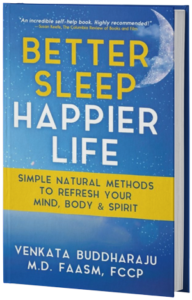By Venkata Buddharaju MD, FAASM, FCCP
Board Certified in Critical Care, Pulmonary & Sleep Medicine (ABIM)
Published on Babyboomers.com
Sleep should always be considered as one of the natural drives, like drinking water when thirsty and eating when hungry. Most of the creatures on the planet just follow those natural cues: wake up and be active while awake, sleep when it is time, and follow natural circadian rhythms set by clock genes. However, when it comes to humans, we tend not to follow those natural cues and spend more time awake, working longer hours with little or no breaks, drinking caffeinated beverages to stay awake, stressed out from work, eating at irregular times of the day, engaging in many activities thinking that they are more productive and fun. In fact it’s exactly opposite, if you spend too much time awake and cut back our required sleep times, you make poor decisions, prone to making errors at work and will be less productive.
You have probably after a poor night of sleep with frequent tossing and turning in the bed, woke up feeling irritable, grumpy, not focused at work, feeling anxious and depressed. In the long run, sleeping less than optimal hours (at least 7 hours as an adult and 8 hours as a teenager age 13-18yrs) of sleep is called chronic sleep deprivation and it increases the risk of hypertension, diabetes, heart attack, stroke, memory loss, cognitive decline, dementia, increased inflammation, impaired immunity to fight against infections, excessive day time fatigue, and more. Now that you know the impact of chronic sleep deprivation on your health and happiness, let’s discuss these 7 tips to preserve your natural sleep drive to maintain a good night sleep:
1. Exercise:
Aerobic exercise for at least 30-40 min a day increases the deeper or slow wave sleep. It also reduces the of risk stroke, hypertension, diabetes, and weight gain. Working out in the morning of fasting will help to lose a few pounds. You can still exercise any time as long as it’s not too close to bedtime, which may prevent you from getting into sleep quickly. Exercise and a good night sleep help reduce feelings of anxiety, and you should be able to handle daily stress better. If you don’t have time to go to a gym, or on days that you are too busy to get up and put your shoes on for a jog or run, you can do quick pushups of 50 or 100 as soon as you get out of the bed in the morning. You can gradually increase the number of pushups over time by first starting with 10 pushups and increase over days and weeks to reach your comfortable set. You can also add few abdominal curls for another 5 min.
2. Diet and Hydration:
Drink plenty of water and liquids to keep you hydrated, ideally in the morning but not too close to the bedtime, to prevent making frequent bathroom trips at night. Eat a healthy and a balanced diet with plenty of fruits, vegetables and nuts especially walnuts and almonds. Tart Cherries and Kiwi fruit have a good source of serotonin and promote sleep. A clinical study on people eating Mediterranean diet showed improvement in sleep quality. Don’t skip breakfast, eat a balanced lunch and eat a light dinner 3 hours before bedtime.
3. Avoid or reduce taking coffee
…especially 6 hours prior to bedtime to help get better sleep at night. Caffeine inhibits a natural sleep-promoting neurotransmitter called Adenosine from the brain, which accumulates from the last wake time and builds up while awake to promote sleep at night time.
4. Avoid smoking and drinking alcohol:
Alcohol can disrupt sleep, especially in the second half of the sleep, and increase risk of snoring and sleep apnea. Nicotine is a stimulant along with other bad health effects of smoking.
5. Sleep surface and pillows:
Find a comfortable mattress and pillows that keep you in a comfortable sleeping position. A good sleep surface is important for optimal sleep.
6. Make your room comfortable:
Keep your bedroom a little cooler (67F), take a warm shower before bedtime to help cool down the body at sleep onset. Avoid bright light exposure at night from cell phones, Computer screens, TV and other devices. Bright light exposure inhibits the production of melatonin from the pineal gland of the brain which is important to maintain sleep and circadian rhythm. Keep your bedroom sleeping environment free of noise.
7. Wind down from your busy day:
Mental calmness by practicing Mindfulness Breathing Exercises by slowly breathing in and out focusing on the breath and counting to 10 with fingers by touching thumb and fingers of both hands. Focusing on the breath brings you back to the present moment, relaxes the mind by controlling nerves. Don’t worry too much what will happen tomorrow or the future, don’t go back and relive in the past because you cannot change it, just be here and focus on the breath for 10 min before bedtime and first thing in the morning after you wake up. Yoga is also an excellent way to bring that balance of mind and body with focused breathing and body movements. Avoid arguments and keep a healthy and happy relationship with people. Listen to your favorite music frequently and prior to sleep. Listening to your favorite songs and genre helps relax the mind and helps make you happy. Take a short nature walk or view nature photos to calm down the mind, connecting with nature calms down the stressed mind.
Venkata Buddharaju, MD, is a board-certified sleep consultant and author of Better Sleep, Happier Life: Simple Natural Methods to Refresh Your Mind, Body and Spirit.

